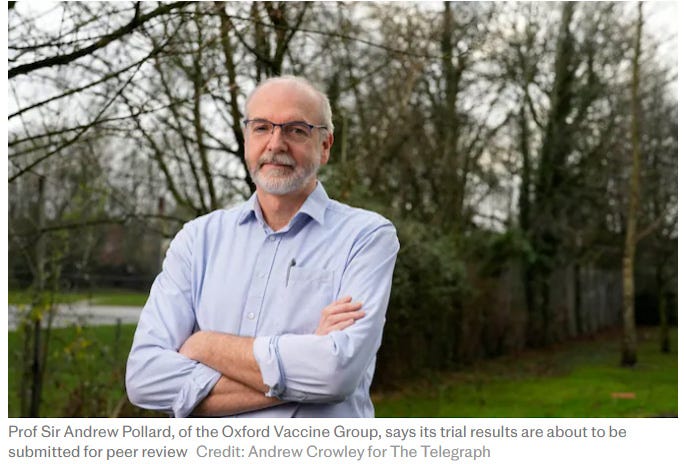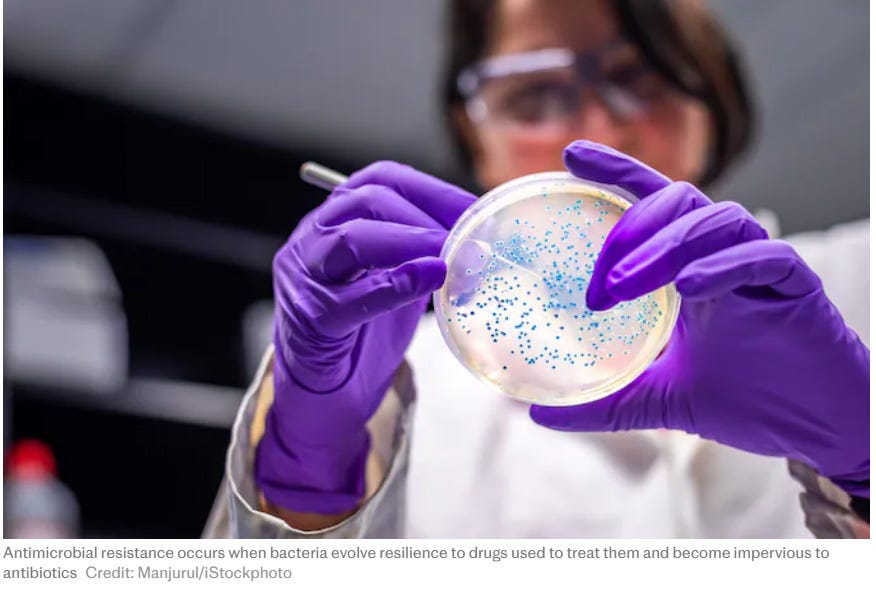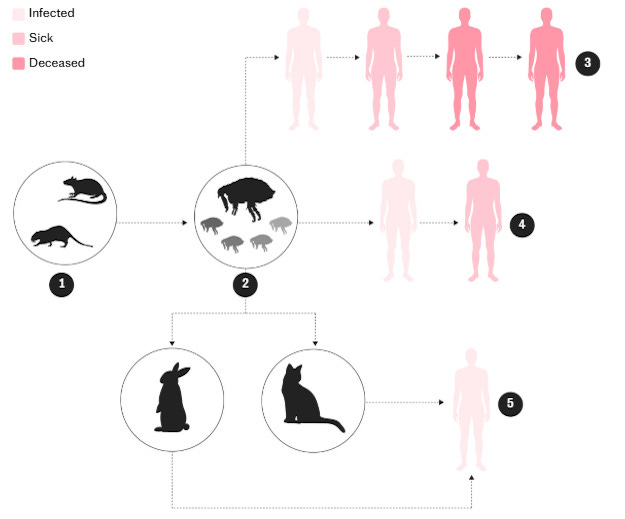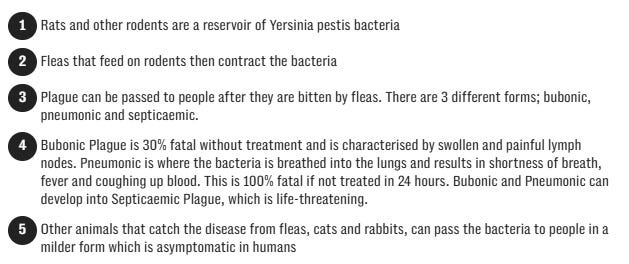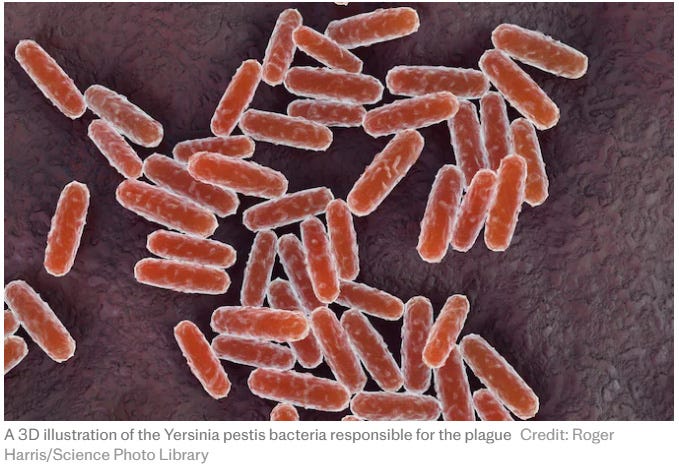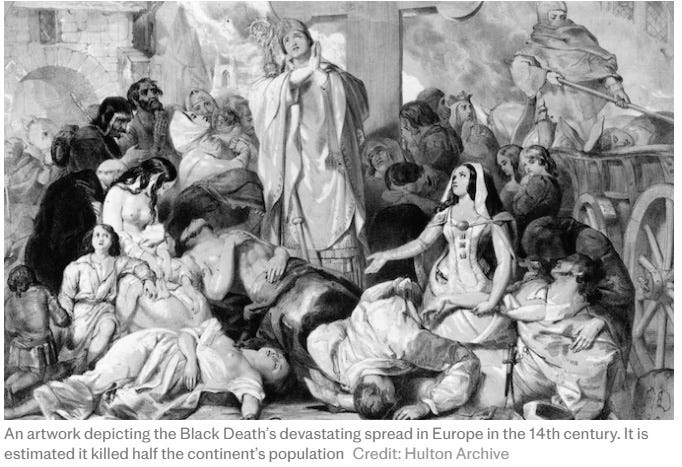Here We Go: Scientists Behind AstraZeneca COVID Jab Rush to Develop Bubonic Plague Vaccine as Fears of the Next Pandemic Loom
Oxford team reports hopeful results in trials as military experts say UK should stock supplies of Black Death inoculation
By Jim Hᴏft
January 5, 2025
In a world still grappling with the fallout from hastily developed COVID-19 vaccines, the same scientific elite is now setting its sights on a new potential crisis: the bubonic plague.
Yes, the same Oxford scientists behind the controversial AstraZeneca COVID jab are now advancing efforts to create a vaccine for a disease that last caused mass devastation during the Middle Ages.
The Bubonic Plague, often referred to as the Black Death, is a serious infectious disease caused by the bacterium Yersinia pestis.
It is one of the three forms of plague (bubonic, septicemic, and pneumonic) and is the most common. The disease primarily affects humans and other mammals and is transmitted through the bite of an infected flea or through direct contact with infected animals.
This historic disease, which wiped out half of Europe’s population in the 1300s, has long been confined to the pages of history books.
Yet, claims of “superbug” strains emerging in distant corners of the world have reignited calls for mass inoculation efforts.
Predictably, climate change and the specter of bioterrorism are once again being trotted out as the justification for this latest round of vaccine development.
Scientists behind the Oxford Covid jab are developing a bubonic plague vaccine amid fears a superbug strain of the Black Death could emerge.
There is no vaccine in the UK for the plague, which has killed around 200 million people worldwide throughout history.
But the team behind the Oxford/AstraZeneca coronavirus jab has now reported progress in its work on an inoculation.
Three of the world’s seven known pandemics have been caused by the plague, a bacterial infection triggered by the Yersinia pestis microbe. It can be treated with antibiotics but none of the several vaccines in development are approved for use.
Scientists have called for the UK to add a Black Death jab to its stockpile as the risk of a superbug strain rises.
And now the Oxford team says a trial of its vaccine on 40 healthy adults which started in 2021 has yielded results which show it is safe and able to produce an immune response in people.
The man behind the trial, Prof Sir Andrew Pollard, director of the Oxford Vaccine Group, told The Telegraph that the results of the trial are to be submitted to a journal for peer review within weeks, with further clinical trials expected.
“The risk in the UK is currently very low. Previous historical pandemics that had high mortality were associated with initiation from fleas on rodents but were driven by person to person spread.”
Government military scientists recently called for a vaccine to be approved and manufactured in bulk quantities because plague still exists in pockets of the world and has “potential for pandemic spread”.
Scientists at Porton Down’s Defence Science and Technology Laboratory (DSTL) wrote in a paper in the journal NPJ Vaccines that vaccines need to be expedited “to prevent future disastrous plague outbreaks”.
This, they add, is compounded by the rising issue of antimicrobial resistance which is creating superbug strains of plague that cannot be easily treated by antibiotics.
How the plague can be passed on to humans
Plague is spread by fleas which transmit the bacteria from the rodents that carry it to the humans they bite. The Black Death outbreak in the 1300s killed half the population of Europe, according to some estimates.
It can manifest as bubonic plague, pneumonic plague or septicemic plague. Bubonic plague is 30 per cent fatal without treatment and is characterized by swollen and painful lymph nodes around the flea bite.
Pneumonic is where the bacteria is breathed into the lungs and results in shortness of breath, fever and coughing up blood. This is 100 per cent fatal if not treated in 24 hours, and people can spread this to other humans via droplets.
Bubonic and pneumonic can also develop into septicaemic plague, which is life-threatening.
Since the advent of antibiotics in the 20th century there has been less concern over plague. However, antimicrobial resistance is now on the march globally and expected to kill 39 million people by 2050.
DSTL scientists say there is a “demonstrable” risk of superbug plague evolving, with such strains already found in Madagascar and Peru.
Professor Tim Atkins, a DTSL Fellow and lead in the chemical, biological and radiological division, told The Telegraph:
“If a person gets infected with an antibiotic-resistant strain of the plague bacteria, treatment might be less effective, and they could remain sick for longer.
“For pneumonic plague (spread by inhalation), this increases the chances of infecting others nearby.
“While resistant strains exist, there are still other antibiotics that can be used as backups. Antibiotic resistance isn’t unique in the plague; it’s also a concern for common infections like MRSA in the UK.”
He added that the current risk of superbug plague currently is “very low” but said this could increase with climate change making it easier for animal diseases to spread to humans,
Dr Simon Clarke, associate professor of cellular microbiology at the University of Reading, said: “Until relatively recently, Yersinia pestis was regarded as widely susceptible to antibiotics, so eminently treatable if infection were detected early enough. However, that’s changing, and resistance is increasing.
“Malign use in bioterrorism or biowarfare could see the bacteria spread relatively efficiently. At a time when we’re being warned of increased risk of everything from cyber warfare to a third nuclear age, use of pathogens to destabilise societies and spread panic might be appealing to some bad actors.
“If that were to happen, vaccination of the whole population would be the only way to grip such a situation quickly, so aligned states would probably be well advised to at least have the potential to quickly generate batches of vaccine.”
These are the experts who created the AstraZeneca COVID jab.
Recall, Pharmaceutical giant AstraZeneca has announced a global withdrawal of its Oxford-AstraZeneca COVID-19 vaccine, known as Vaxzevria, after acknowledging in court that the vaccine could cause rare but serious side effects.
The decision comes months after the company admitted for the first time in court documents that the vaccine could lead to Thrombosis with Thrombocytopenia Syndrome (TTS), a condition involving blood clots and low blood platelet counts.
AstraZeneca voluntarily withdrew its marketing authorization for Vaxzevria in the European Union, with the withdrawal taking effect on Tuesday following an application made on March 5, the Telegraph reported.
Despite the timing, AstraZeneca insists that the decision to pull the vaccine from the market was based on commercial reasons, specifically citing declining demand due to the availability of newer vaccines designed to combat emerging variants.
READ MORE:
AstraZeneca withdraws Covid vaccine worldwide after admitting it can cause rare blood clots
AstraZeneca Covid jab Compensation Claims Could be one of the Biggest Battles of its Kind.
The HIDDEN HISTORY of vaccines and the horrors of toxin accumulation
Scientists Create New Coronavirus Vaccine for Viruses That Don’t Exist Yet
Share or comment on this article.
Your support is crucial in exposing fake news and in helping us defeat mass censorship.






